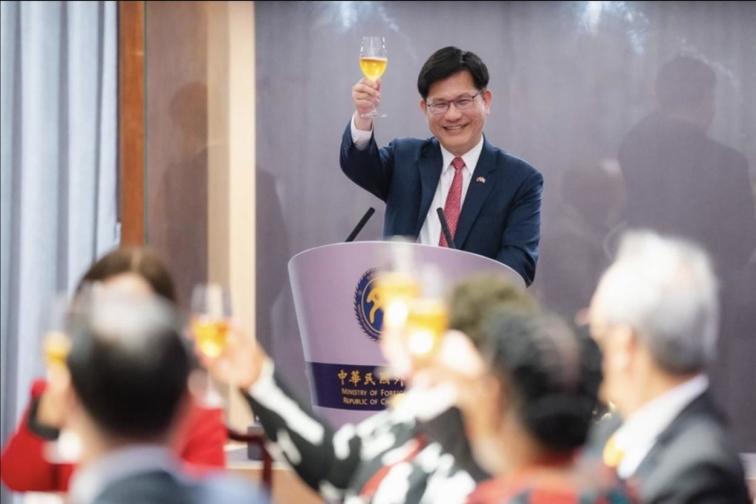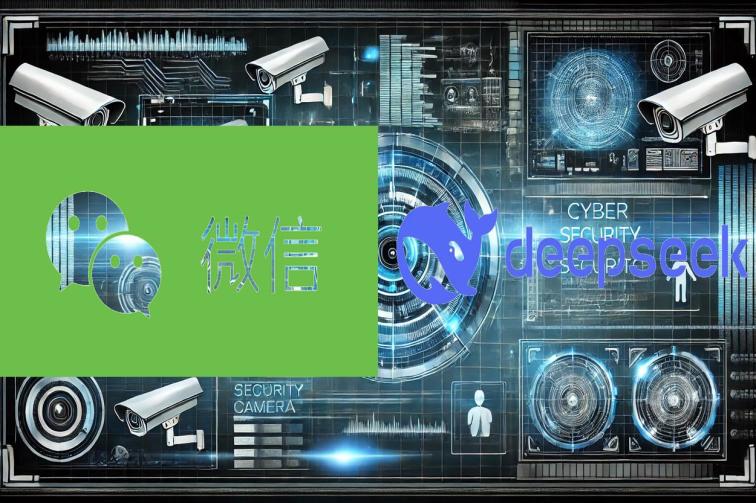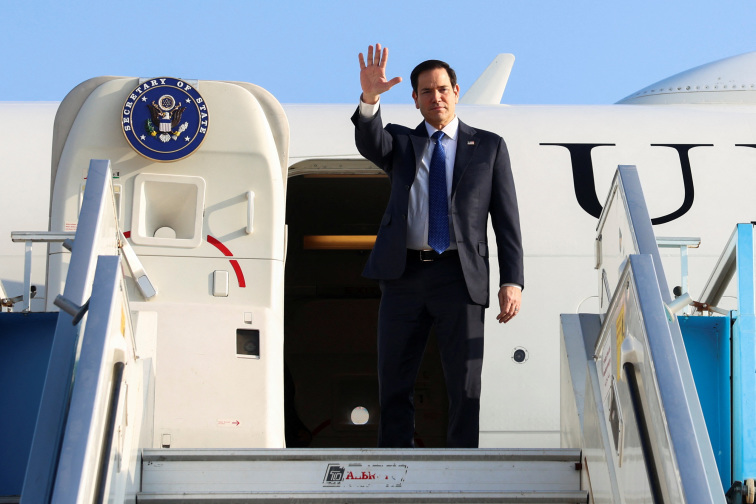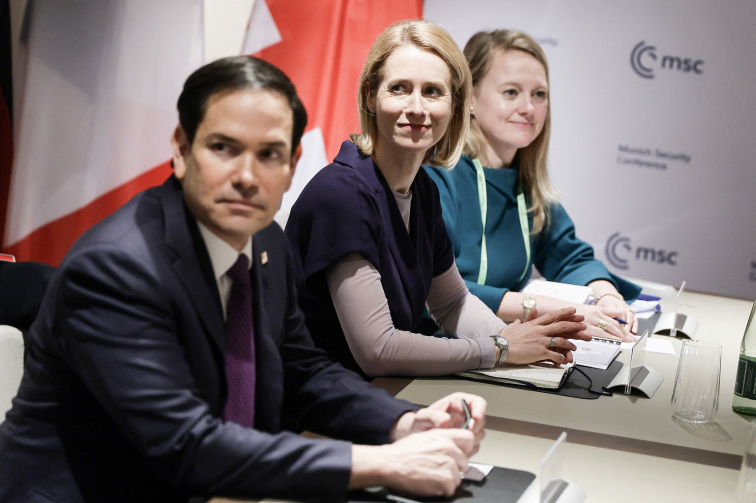File Photo: Republican presidential candidate and former U.S. President Donald Trump appears alongside U.S. Senator Marco Rubio at a campaign rally held at the J.S. Dorton Arena in Raleigh, North Carolina, on November 4, 2024. (Chip Somodevilla/Getty Images)
[People News] Trump’s first month as U.S. President has been a whirlwind, leaving America and the world stunned. His policies have brought a sense of upheaval. Domestically, he has signed executive orders on tax cuts, withdrawing from certain U.N. organizations, and authorized Elon Musk to lead a U.S. anti-corruption campaign. He shut down USAID, reorganized or is in the process of reorganizing the CIA, FBI, Departments of Education, Agriculture, and Defense, exposing corruption in these institutions.
Internationally, Trump has applied pressure on various issues involving the Panama Canal, hostages, Greenland, fentanyl, military spending, tariffs, Gaza, and the Russia-Ukraine war. His targets have included Panama, Latin America, Denmark, Canada, Mexico, the EU, the Chinese Communist Party (CCP), Hamas, and Russia/Ukraine. He even ordered cross-border military strikes on Mexican drug cartels. On February 11, the U.S. Navy confirmed that two warships sailed through the Taiwan Strait for the first time under Trump’s presidency, provoking discontent from the CCP.
Trump’s “2.0 version” is clearly more aggressive than his “1.0 version,” causing anxiety within the CCP. Before Trump took office, the CCP had lowered its tone and expressed a desire for mutual cooperation, hoping to strike deals with the businessman-turned-president to reduce conflict. However, Trump’s appointments—such as a Secretary of State and National Security Advisor with hardline stances against the CCP—along with public statements by these officials and members of Congress identifying the CCP as their primary adversary, have made it clear that the U.S. is pursuing a defined strategic objective. The CCP’s hopes of “peaceful coexistence” with the U.S. through deception appear unattainable.
Chinese experts are well aware of this. On February 12, China’s state-backed Observer Network published an interview with Jin Canrong, a professor at Renmin University believed to have connections with the CCP leadership. The article, titled “Trump is Preparing for a ‘Showdown’ with China, but Two Things Were Unexpected,” covers various topics and likely reflects views that have been reported to the CCP’s upper echelons.
First, Jin Canrong acknowledged that the "2.0 version" of Trump’s shockwave is much stronger than the "1.0 version" and listed some of the facts mentioned above, also admitting that Trump’s pressure has already shown initial effects in many areas. He further stated that "in two aspects, it was beyond our expectations." The "we" he referred to clearly represents the CCP authorities.
What were the two aspects that surprised the CCP? One was in foreign policy. The CCP originally expected Trump to continue advancing the trade war, pressuring other countries, and withdrawing from international organizations. However, Trump first targeted Canada, Greenland, Panama, and Mexican drug cartels. What the CCP did not anticipate was rooted in fear because Trump’s highly purposeful actions were all aimed at curbing the CCP’s expansion and its role as a behind-the-scenes manipulator.
The other aspect was in domestic policy. Initially, it was believed that Trump would "disrupt" four areas: revitalizing manufacturing, expelling immigrants, restoring traditional values, and reorganizing government institutions. However, what caught the CCP off guard was that Trump prioritized "government reorganization." As an international relations scholar, Jin Canrong deliberately used the term "expelling immigrants" instead of "expelling illegal immigrants," which is a typical CCP deception tactic. Similarly, the CCP's surprise here also stemmed from fear because corruption behind U.S. government agencies such as USAID often involved CCP influence. For example, USAID was revealed to have funded the Wuhan Institute of Virology, allegedly linked to the 2020 virus leak.
Jin also admitted that after U.S. Secretary of State Marco Rubio visited Panama, its government plans to terminate its port management contract with Li Ka-shing’s Hutchison Whampoa. Jin explained that Panama has long struggled with governance, but the key question is: Why didn’t Panama give the management rights to a U.S. company? Why did it go to a Hong Kong company with CCP ties? Jin is aware of the underlying issues but refrains from saying more.
Secondly, when asked whether "Rubio becoming Secretary of State would be good or bad for U.S.-China relations," Jin Canrong stated that some of Trump's positive remarks about Beijing were filled with "false flattery." He explained, "This kind of flattery is common among businessmen who use compliments to gain benefits." The CCP "should not be deceived by these superficial pleasantries" and should instead focus on Trump's actual actions, especially how he appoints officials. A notable characteristic of Trump's foreign policy during the 2.0 era is that he appointed a large number of officials with a tough stance on China, such as Rubio and National Security Advisor Waltz.
According to Rubio’s recent remarks, Jin Canrong stated that he still "views China as the primary threat." Here, Jin Canrong deliberately confused "China" with the "Chinese Communist Party (CCP)." Senior U.S. officials like Rubio and Vice President Vance have recently made clear distinctions between "China" and "the CCP" in their statements, sometimes referring to "Communist China" or directly to "the CCP." Jin Canrong’s intentional conflation serves the same purpose as that of his CCP superiors—to deceive the public. In reality, how many of the CCP's evil actions are supported by the vast majority of the Chinese people?
Third, Jin Canrong assessed that the core diplomatic strategy of Trump 2.0 remains "confronting the CCP." He is readjusting America’s diplomatic framework, stating, "While these moves may seem odd, they can be understood from the perspective of preparing for a strategic showdown with the CCP. Whether in Trump’s 1.0 era or the 2.0 era, it is evident that a series of measures against the CCP have been laying the groundwork for an eventual showdown." He added, "Although his rhetoric appears softer than before, Trump remains unwavering in advancing his policies against the CCP through concrete actions."
In short, Jin Canrong concluded that everything Trump is doing domestically and internationally is to prepare for an eventual confrontation with the CCP. The author agrees with this conclusion. Domestically, Trump’s initiatives are aimed at strengthening America’s capabilities and cohesion, while internationally, Trump is building an anti-communist alliance.
How Should the CCP Respond to This Situation? Can Jin Canrong’s Advice Be Followed? Jin Canrong suggested that the CCP should "make full preparations, enhance domestic strength, and continue to deepen diplomatic relations," emphasizing that the CCP's three "magic weapons" — the United Front, Armed Struggle, and Party Building — remain relevant.
However, whether the CCP can implement these suggestions is a significant question. "Making full preparations" likely refers to preparations in areas such as military, economy, and people's livelihood. In recent years, the CCP has increased its military spending, reportedly built new military bunkers for high-level officials in Beijing, launched the supply and marketing cooperatives, and promoted the sale of emergency supplies as part of its preparations. "Enhancing domestic strength" refers not only to military power but primarily to economic power. However, with the mass withdrawal of foreign investment, the closure of private enterprises, and a surge in unemployment, how can the CCP enhance its domestic strength? As for "deepening diplomatic relations," the CCP has often relied on lavish spending. Without money, how many countries would be willing to risk U.S. sanctions to draw closer to the CCP?
Now, let’s examine the CCP’s three "magic weapons." According to the 2018 Hoover Report, the CCP has long infiltrated and manipulated the U.S. government, universities, media, think tanks, businesses, and overseas Chinese communities. Many U.S. government officials, members of Congress, and business leaders have colluded with the CCP and sold out U.S. interests. All of this has been orchestrated behind the scenes by the CCP's United Front Work Department, which aims to destabilize the U.S. from within and undermine its leadership of the free world.
On July 29, 2022, at the CCP’s Central United Front Work Conference — the first in nine years — Xi Jinping emphasized the United Front’s role in "safeguarding national sovereignty, security, and development interests" and in "supporting the central mission and serving the big picture." Could this be interpreted as strengthening the United Front efforts in Taiwan and within the U.S. government? Could these United Front targets be mobilized in times of heightened tension or conflict? And how many such targets are embedded within Taiwan, the U.S. government, and even the U.S. military?
However, the U.S. has become more aware of the CCP’s United Front and infiltration over the past five to six years. On May 4, 2023, Mike Gallagher, then-chair of the U.S. Congressional Select Committee on China, spoke on the Hugh Hewitt Show about the CCP’s "United Front work" and announced plans to educate his Congressional colleagues and the American public about the United Front through real-life cases. He also proposed stricter foreign agent registration laws to curb United Front operations.
The U.S. has also ramped up its arrests of CCP spies in recent years. During Trump's tenure, U.S. intelligence agencies are expected to arrest more CCP agents or deter them from acting. They are also closely monitoring illegal CCP military and secret police agents entering the U.S. Therefore, how effective the CCP's United Front strategy will be in future U.S.-China relations remains uncertain.
The second "magic weapon" is "armed struggle," but this depends on actual strength. War requires financial and military technological strength. Jin Canrong claimed that the CCP possesses such strengths, citing China’s GDP as approaching 130% of the U.S., its productivity surpassing the U.S., and its complete industrial system and strong innovation capacity. He also pointed to China’s possession of DF-31AG intercontinental missiles and numerous drones. However, Jin didn’t mention that China cannot produce high-end chips on its own and relies on theft. China also imports engines and depends on foreign precision medical equipment in its hospitals. Can such a nation truly claim to be powerful? Additionally, in the event of war, it’s not inconceivable that the U.S. could paralyze the CCP’s operational systems through long-range strikes.
The third "magic weapon" is "Party Building," which the CCP has promoted for years. Yet corruption among CCP officials continues unabated, and few genuinely adhere to Marxist-Leninist ideology. Using Party loyalty to counter the U.S. seems rather absurd.
Jin also highlighted the role of social media and public intellectuals in spreading panic and negative news to influence Chinese citizens. He labeled them as "frauds" and claimed that addressing this issue is critical for China. Yet, isn’t Jin Canrong himself a "fraud" for supporting the CCP with false narratives?
In my view, Jin Canrong is not only deceiving the Chinese people but also misleading the CCP leadership. Toward the end of the interview, Jin argued that the U.S. strategy has a fundamental flaw: its goal is global control, which requires the ability to attack any country at will. In contrast, the CCP’s sole strategic goal is "unification," which allegedly prevents the U.S. from applying pressure at will. He claimed that the CCP already has the ability to achieve this goal, which disrupts U.S. strategic logic.
Jin further suggested that if the CCP decides to confront the U.S. in the future, it could openly declare: "You cannot arbitrarily use force against countries that maintain close ties with China, such as Cambodia, Thailand, and Pakistan." He claimed that the U.S. would have no choice but to accept this: "I can attack whoever I want, except for China and the countries it protects." Jin added that this list would continue to grow over time.
It’s unclear where Jin’s confidence comes from and why he’s conveying this to the CCP leadership. Does he truly believe the "three magic weapons" are effective? On February 14, Chinese Foreign Minister Wang Yi issued a stern warning to the U.S. at the Munich Security Conference, stating that China would "fight to the end" if the U.S. attempted to contain China. Was this influenced by Jin’s advice?
In early February, the U.S. State Department updated its "U.S.-Taiwan Relations" webpage, removing language that stated the U.S. did not support Taiwan’s independence. It also added language emphasizing "avoiding coercion" and resolving cross-strait issues "in a manner acceptable to both sides." Furthermore, the recent passage of U.S. warships through the Taiwan Strait was a clear message. There are also reports that the Trump administration will increase arms sales to Taiwan. Isn’t this all intended to pressure the CCP?
If the CCP leadership follows Jin’s advice or becomes overconfident and decides to confront the U.S. at any cost, it will face one wave of retaliation after another. Don’t believe it? Just wait and see.
(Originally published in People News)










News magazine bootstrap themes!
I like this themes, fast loading and look profesional
Thank you Carlos!
You're welcome!
Please support me with give positive rating!
Yes Sure!